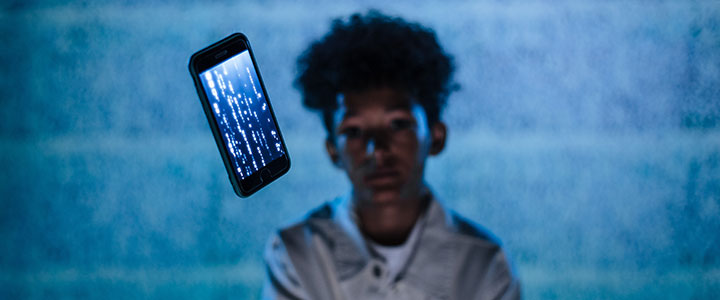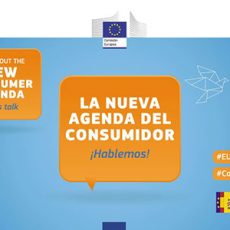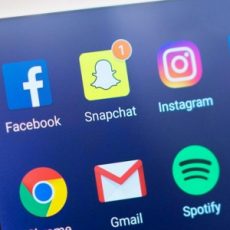
In the digital economy we are all, several times a day, a product. Because if the product is free, the product is us. We’re all more or less aware of this reality, which years ago went unnoticed. But we are still acting as if we were blindfolded. An Internet search engine, our favourite social network, the blue dot we follow on the map when we visit another city… we think everything is free, but it isn’t. Paying with data is paying, and with our data large technology platforms, from the United States or China, are building empires that now border on monopolies.
With the power of their financial muscle and the almost magical efficiency of their products and services, these companies have gotten us used to situations, in the digital world, that would be inconceivable to us in the physical one. We have machines in our living rooms that listen to our conversations, our data travels uncontrolled in order to sell us advertising, they feed us false information and extremist videos, which stir up our darkest impulses. They know where we are and what concerns us.
But at least we’re adults; supposedly we know what we’re doing. But this same business model is also used on minors. Children and teenagers can also access extreme content on YouTube, receive disinformation, be deceived by strangers, suffer the contemporary anxiety of checking Instagram and feeling that everyone is more attractive, more clever, and more fun than you are. It does not seem, by the way, that the recently passed Law on the Protection of Children and Adolescents from Violence takes the digital realm much into account: of its sixty articles, only two refer to the technological field.
The big platforms that make money off these situations try to shirk their responsibility, but the fact is that they’ve faced headwinds for some time now. In the case of Facebook, the situation is especially complicated: first through leaks to the Wall Street Journal and then testifying before the United States Senate, former Facebook executive Frances Haugen made it clear that the company knew of Instagram’s harmful effects on teenage girls. And Facebook didn’t care, because the only important thing is the bottom line.
We know that children and teens have always been a juicy business target. But this isn’t about selling toys, donuts, sneakers, or video game consoles. It’s about selling data, personal and often intimate data, that is captured through strategies to monopolize one of our most precious assets: our attention. I repeat, a vulnerable part of our society, children and adolescents, are also in this game. The algorithm also decides what to teach them, what to offer them, how to hypnotize them. And it’s not designed by an engineer concerned about the emotional stability of children.
We’re not saying we’re shocked, shocked!, that there’s gambling in this casino, like in the famous scene from Casablanca. What we condemn is that there are also children gambling in this casino. And some of the consequences are frightening. I recommend you take a look at the report Viral Violence by Save the Children, which identifies up to eight types of attacks that children suffer online, such as cyberbullying, incitement to harmful behaviour, or what is being called ‘sextortion’. Or consider data from the Fundación ANAR (Ayuda al Niño y Adolescente en Riesgo, a group that helps at-risk children and adolescents): uncontrolled use of technology plays a central role in 29.9% of the cases they handle.
This complaint about the risks that children and adolescents face on the Internet isn’t about being puritanical. The digital transition offers many opportunities, and minors have to participate in this setting. But we need to make some clear rules of the game, which cannot be the same for adults as they are for a sixteen-year-old teenager or a seven-year-old boy.
What to do then? The first thing is to become aware of the situation: our data has economic value, and we cannot just hand it over as if it were nothing. The flashlight application we use on our mobile phone shouldn’t access our contact list, for example. We can play the Internet giants’ game, but the least they can do is make their rules clear, something that is very complicated if we’re talking about minors.
We also have to understand that this is not just another commercial battle, or a simple question of consumer rights. It’s this and more. It has a geopolitical, systemic derivative that escapes our daily concerns but which will, one way or another, end up reaching us.
The digital transition is shaping a new world, one in which we Europeans currently have a dangerous bit part. We are mere consumers, mere providers of data, trapped between very different models from two giants, China and the United States. Fortunately, we are closer to the North American model, but that doesn’t mean it’s ours.
Beyond the individual responsibility of each one of us, we need a European digital transition model, aligned with our values, and in which all companies compete on equal terms without constraining innovation nor allowing that some have fiscal and labour commitments that others are able to avoid. We must create a playing field with clear rules, one that is balanced and takes the vulnerable into consideration.
This is a challenge that far transcends Spain’s borders. The battle is fought between large global blocs and finally the EU, with the current Commission at the forefront, seems to have reacted. The Digital Services Act and the Digital Markets Act, currently in process, are on the right track, but we need more speed, agility, and boldness. The technological giants have a lot of advantage and, if we don’t react, by the time we realise it we’ll have societies totally defined by their interests, which are not ours. And the hardest hit will be the most vulnerable, such as children and adolescents.
Ana Caballero
Vice President and spokesperson for the European Association for Digital Transition.
This article was originally published in the Opinion section of the newspaper El Mundo




